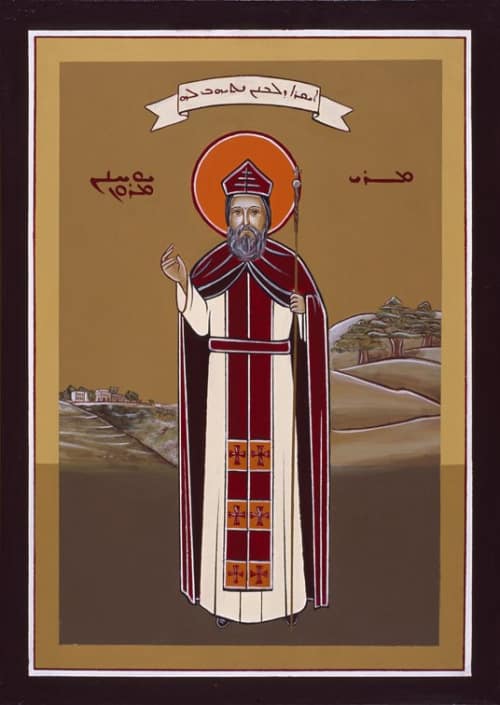
Youhanna (John) Maroun was the first Maronite Patriarch of Antioch, elected in 685 to lead the people who came to be known as the Maronites.
The Hoosoyo Prayer (Prayer of Forgiveness) from the Maronite Liturgy on his Feast, encapsulates who he is:
“Blessed are you, Saint John Maroun, for you began a blessed era in the history of our Church when you became our first patriarch.
Blessed are you, for you inspired hearts and minds by your teaching and example, and confirmed believers in the true faith.
Blessed are you, for you were pleased to go to Lebanon to serve and guide your people.
Blessed are you, for you fought the good fight for your people: you cared for the sick and the poor, and you established churches and monasteries, strengthening the holy Catholic faith, until God called you, in the state of holiness, to his heavenly kingdom”.
Youhanna Maroun was born to a noble family in 628 in Sirmaniyah or Sarum, a village in modern day Syria, where his father was governor.
Known first as John the Sarumite, he was educated in Antioch and then in the Monastery of Saint Maroun, where he mastered sacred scripture as well as mathematics, sciences, philosophy, theology, and linguistics. It was there that he later professed his monastic vows and was ordained to the priesthood, adopting the monastic name of Youhanna Maroun.
He was a gifted preacher and a teacher, who was also blessed with leadership qualities. He became a very influential person in his time, and being well educated began to write on diverse topics such as the sacraments, managing church property, liturgy and more. He composed the Eucharistic Prayer which is still used in the Maronite mass today.
He taught and preached the Doctrine of the Council of Chalcedon, which proclaimed that in Christ there are two natures – human and divine. His style of teaching converted many to the Maronite fold and brought many non-believers to embrace the faith.
The Patriarchal Sea of Antioch was vacant from 609 to 683AD due to religious and civil unrest of the time. The Maronites used this opportunity to elect Youhanna Maroun Patriarch in 685A.D., the superior from their monastery to tend to their daily needs. His obedience of John Maroun to the Church of Rome and his love for his Antiochene heritage enabled him to ascend to the See of Antioch—the most ancient See of the Catholic Church.
The new patriarch travelled to Rome to receive papal approval. Pope Sergius confirmed him as “Patriarch of Antioch and all the East,” and gave him the Pallium as a sign of hierarchical succession and supreme authority.
As a civil and a church leader, Youhanna Maroun moved the patriarchal See from Antioch to Lebanon, bringing the Maronites under one banner and preserving the Maronite Antiochene liturgical and theological identity.
St Youhanna Maroun’s Feast Day, which falls on 2 March, is an opportunity for us all to look to emulate his zeal, his piety and leadership which made him the leader who faced difficulties head on, fought to defend his people, and brought independence to the Maronite Church.
St Youhanna Maroun teaches us the importance of steadfast faith in the face of trials and tribulations. Through keeping firm faith, we, like St John Maroun, can become Christ-like leaders in our communities and families.
The heroic and virtuous qualities that St John Maroun displayed in his life, remain for the faithful, a great example of how our faith can help us navigate through the challenges of life.
On the occasion of his Feast, and every day, let us seek the intercession of St Youhanna Maroun, so we too can lead in love and hope on the road to salvation. Amen
Father Charbel is a husband and father of three boys. Born and raised in Australia, he was the second Aussie born married man ordained to Maronite priesthood. He currently serves as assistant Parish priest at Our Lady of Lebanon Harris Park and in the diocesan youth office of the Maronite Eparchy.
Related:
Melto D’Moronoyo – St Maroun, a prayer on the lips
Melto D’Moronoyo: Learning wisdom’s lessons
